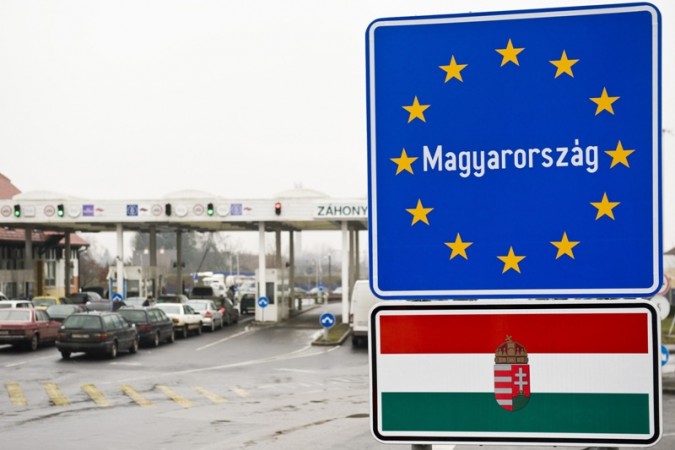This has been an annus horribilis for the European Union. In the spring and summer, the euro looked set to crumble, as Greece devolved into political turmoil, teetering on the brink of Grexit and as deep divisions within the eurozone emerged about how to deal with the debt crisis and whether to even salvage the unity of the euro. As often happens in the EU, the common currency’s unity was saved at the very last minute–in the middle of the night as key players were about to throw in the towel–thanks in large part to the insistence of the Polish President of the European Council, Donald Tusk.
It’s possible that the Schengen Area, which until now has offered passport-free travel among 26 countries in Europe, will also be salvaged in the last minute and perhaps the current crisis will actually lead to deeper European integration. The EU does, after all, have a history of strengthening integration as a result of crisis. And even politicians like Hungary’s Prime Minister Viktor Orbán, who has spent much of the year lambasting the West (which he feels is in decline and is ruled by out-of-touch liberals), need the Schengen Area to survive. The Hungarian Spectrum published a piece on this yesterday, quoting Hungary’s Foreign Minister, Péter Szijjártó, on the possibility that a handful of western European countries might create their own Schengen Zone, while leaving everyone else out in the cold. “Those countries want to create an inner circle for themselves,” said Mr. Szijjártó angrily of an idea raised by the Netherlands of creating an area of passport-free travel among France, Germany, Austria and the Benelux countries. As the Hungarian Spectrum points out, the idea of ending the Schengen Area as we know it and of no more border-free travel is problematic in Hungary for both psychological and economic reasons.

The Záhony border crossing between Hungary and Ukraine. This represents one of the EU’s external borders, which Hungarian border security patrols and protects and where you will come into contact with Hungarian border guards and customs officials. Photo: MTI.
The former Eastern bloc was closed in with barbed wire fences prior to 1989, blocked off from the West. Hungarians had to ask for state permission to travel not only to the West, but even to neighbouring countries like Romania, where they may have had family in the Hungarian-majority areas of Transylvania. Visiting family even in neighbouring communist Romania entailed exhausting bureaucratic red tape and the trip could not be made frequently.
Benjamin Tallis is with Prague’s Institute of International Relations. Speaking to Radio Prague on the possibilities of the demise of the Schengen Zone, he noted:
“Being excluded from the Schengen Area is an indication of Europe of different speeds. Certainly Czech people and others in the Visegrad Four – in Poland, Hungary and Slovakia – have gained an awful lot from being in Schengen, from the feeling of being part of Europe and the feeling of being part of the EU, and being able to exercise one of the real benefits that people can feel on a daily basis. But also from the sense of belonging this provides. So there’s definitely a danger of creating a sort of hierarchy of belonging, a two-tier Europe. But we also have to ask where that slap in the face is coming from. It’s coming from an unwillingness to share the burdens as well as the benefits of being members of Schengen.”
That last sentence is in reference to proposed quotas that the European Commission has been trying to establish, in order to divide some of the refugees among member states in a more equitable manner, rather than have Germany bear the burden almost on its own. Usually quarrelsome Eastern European countries were able to agree on one thing: they did not want mandatory quotas and really did not want to accept any of the refugees from Syria and elsewhere. We already know of Hungary’s virulently populist Fidesz government, but Slovak Prime Minister Robert Fico’s ruling Smer party – although left-wing – is no more welcoming than Budapest. And Poland recently elected the nationalist-conservative Law and Justice Party to power, which sees Viktor Orbán’s regime as a role model.
The rationale behind Mr. Orbán’s support for the Schengen Area and borderless travel is also economic. Hungary is the world’s 40th largest export economy–Hungarian exports are worth over $100 billion per year. Hungary remains an important manufacturer of cars (this sector of the economy is worth over $6 billion), as well as vehicle parts and pharmaceuticals. One quarter of all Hungarian exports are to Germany, while Italy, Austria and France are also important trade partners. Together, these four countries account for 45% of Hungary’s exports and this business is strongly boosted by the Schengen Agreement. Tariff barriers and lengthy waits at international borders for trucks carrying Hungarian goods would drastically increase the cost of doing business for many companies operating in Hungary.
Mr. Orbán has been a supporter of expanding the European Union with new members–on Friday, he declared that Hungary would support Macedonia’s admission to the EU. He also pointed out that “if Schengen dies, then walls and fences will rise and border checks will re-appear in places, where these have not existed.”
For all his nationalist, anti-liberal and anti-western tough talk, Mr. Orbán knows what side his bread is buttered on.



